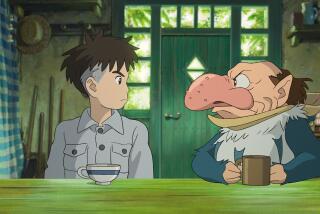Japanese Will Invest Up to $250 Million in Disney Filmmaking
- Share via
Japanese investors will pump as much as $250 million into filmmaking at Walt Disney Studios under a joint venture announced Thursday between Disney and two independent companies, the investment firm of Nomura Babcock & Brown and Interscope Communications Co.
The deal calls for Nomura Babcock to co-finance films that Interscope produces for Disney over the next four years. The movies will be marketed and distributed under Disney’s three production banners--Touchstone Pictures, Hollywood Pictures and Walt Disney Pictures.
Interscope, which has produced such highly successful fare as “Three Men and a Baby” for Disney, has 16 projects in development at the studio. Under the plan, Disney will match any investment made by its partners. Nomura Babcock has committed to raise at least $50 million through its Japanese clients, but executives familiar with the joint venture said the investment will probably be much greater.
Financial analysts pointed out that the cash infusion will significantly reduce Disney’s risk at the box office. It also comes at a time when the studio is stepping up production. Disney, which led all other studios this summer with 19.9% of the domestic box office receipts, expects to release up to 25 films under its three divisions next year.
“Basically, Disney has come up with a way to fund external production,” said Christopher P. Dixon of Kidder, Peabody & Co. “It’s exciting for everyone. . . . This is yet another example of Disney’s focus and ability to come up with unique financial engineering techniques.”
Disney Studios President Richard Frank said he values the opportunity to continue working with Interscope. One of the studio’s most successful collaborators, Interscope developed “Cocktail” and “Outrageous Fortune” for Disney, in addition to “Three Men and a Baby.”
The privately held company, owned by Ted Field, also developed “Bird on a Wire” for Universal Pictures this year. Interscope movies have grossed more than $750 million worldwide.
Interscope, which is known for light, commercially oriented films, already has a “first look” deal with Disney. Under the new agreement, Disney also has the option of suggesting projects to Interscope. “The new deal will only finance a small portion of our slate,” Frank said. “But the most important thing for us is that we are still in business with Interscope.”
Disney and Nomura Babcock will evenly split all profits from their joint ventures after costs are subtracted, under the terms of the deal. Interscope’s participation was not spelled out, but the company clearly stands to see more of its films produced now.
Chairman Robert Cort said the deal puts Interscope in an extremely strong position.
“We’ve never been a company that struggled to get its movies made,” Cort said. “But this certainly increases our ability to do that. . . . Our voice is now that much stronger.”
Interscope also has a strong backer in Nomura Babcock. Founded in 1986, the company is 80% owned by Japan’s largest securities firm, Nomura Securities Co., with the balance held by the U.S. investment banking firm Babcock & Brown.
Nomura Babcock is no stranger to Hollywood. In May it invested $100 million in Morgan Creek Productions, another independent film company. Richard Koffey, Babcock & Brown’s managing director, said discussions over the Interscope deal started more than a year ago.
Koffey foresaw no problems in raising the funds from the company’s Japanese investors, noting that Japanese firms have already made sizable investments in such companies as Largo Entertainment and Carolco Pictures, not to mention Sony Corp.’s purchase of Columbia Pictures Entertainment Co.
“We think this a tremendous transaction to be marketing,” he said.
The agreement comes as the funds from Disney’s last investment partnership, Silver Screen Partners IV, are running out. Disney has realized about $1 billion from the four offerings. Frank said the company is still exploring whether to continue the relationship.
On Thursday, when the stock market was broadly lower, Disney’s stock lost $2.875 a share to close at $96.25.
More to Read
The biggest entertainment stories
Get our big stories about Hollywood, film, television, music, arts, culture and more right in your inbox as soon as they publish.
You may occasionally receive promotional content from the Los Angeles Times.










